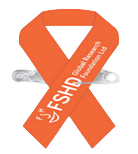GRANT 44
Research Institution: Murdoch Children’s Research Institute
Principle Investigator: Ms Katy de Valle
Type: Melbourne, Australia
Project title: “Physical function outcome measures in paediatric FSHD”
Status: Active
Summary
This study will investigate two promising outcome measures that can be used in children diagnosed with FSHD. The Facioscapulohumeral Dystrophy-Composite Outcome Measure (FSH-COM) and Facioscapulohumeral Dystrophy Health Index (FSH-HI) are two FSHD-specific outcomes that have been used in adults with the condition, however their usefulness in children with the condition are less well known. The FSH-COM evaluates physical function (what the person can do), while the FSH-HI measures a person’s perception of disease burden (the impact the condition has on their life). This study will specifically look at the reliability and validity of these two outcomes measures in children aged 5-18 years with a genetic diagnosis of FSHD. As well as looking at how consistent these outcome measures are over a short time period, we will also compare these FSHD specific measures with two other measures of physical functioning and quality of life, the Motor Function Measure (MFM), and the Paediatric Quality of Life (PedsQL™) neuromuscular module. A better understanding of the reliability and validity of these measures in children with FSHD will enhance their readiness for use in future clinical studies, improving our ability to rapidly and effectively assess the efficacy (or lack thereof) of therapeutic agents for FSHD in children.
PROGRESS REPORTS
Update September 2019
Grant 44: Physical outcome measures in paediatric patients
The FSH-COM and FSH-HI are two disease-specific outcome measures that assess elements of physical function. The FSH-COM is a performance based measure of physical functioning and the FSH-HI a self-report questionnaire of disease burden. Neither measure has been evaluated in children with FSHD. The collection of reliability and validity data of the FSH-COM and the FSH-HI for this project is ongoing.
Recruitment and data collection from children with FSHD known to be living in Victoria, has been completed. Participants known to The Royal Children’s Hospital Neuromuscular Clinic and those identified by advertising through FSHD Global and other relevant patient organisations have been contacted and all interested participants recruited. Recruitment currently stands at fourteen, thirteen participants recruited from within Victoria and one from Tasmania. Participants recruited to date range in age from 7-18 years with a mean age of 12.9 years. Disease severity (assessed by the FSH-clinical score) range is 2-12 and mean severity score 5/15.
Five female and 9 male participants have been recruited. Collection of both reliability and validity data required participants to attend The Royal Children’s Hospital on two occasions. If participants were unable to commit to two visits, validity data only was collected. Two subjects elected not to return for a second visit due to school commitments therefore could not complete the reliability data for the FSH-COM outcome measure. Of those two subjects only one did not complete reliability for the FSH-HI questionnaire. Validity data has been collected for all participants.
No unforeseen issues have occurred during data collection to date. Collection of physical function data using the FSH-COM has been possible with all children. There have not been any items too complex for younger children to complete. Children with poor attention and those younger than 10 years have found the FSH-HI questionnaire more difficult to complete independently. In this situation the same caregiver has been asked to assist the child to complete the questionnaire on each occasion. Data has been checked and cleaned. Very few missing data points are evident. We aim is to obtain at least 18 reliability and validity data points for statistical analysis.
The project will now focus on recruiting additional participants from other within centres and New Zealand. There have been no publications to date however the protocol for this study has been accepted as a poster presentation at World Muscle Society Conference in Copenhagen this year. We plan to complete recruitment by the end of 2019 and hope to publish this data by July 2020.




